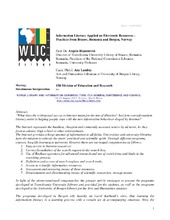| dc.description.abstract | What does the widespread access to Internet mean for the use of libraries? And how can information literacy assist in helping people cope with the new information behaviour shaped by Internet? The Internet represents the handiest, cheapest and commonly accessed source by all users, be they from academic, high school or other environments. The Internet provides a large amount of information in all fields. Universities and university libraries have the mission to educate the users’ practical and scientific spirit. Through different programs, courses, long life learning in university libraries there are envisaged competencies as follows: 1. Easy access to Internet resources; 2. Correct formulation of the search request in the search box; 3. Use of Boolean operators for advanced research and use of restrictions and limits in the searching process; 4. Definition and access of search engines and search tools; 5. Access to scientific information resources 6. Assessment and assessing means of these resources 7. Dissemination and disseminating means of scientific researches, storage means In light of the above-mentioned competencies, the present article envisages to present the programs developed at Transilvania University Library and provided for the students, as well as the programs developed at the University of Bergen Library for the Arts and Humanities students. The programs developed in Bergen rely heavily on Carol Kulthaul’s view, that learning the information literacy is a learning process with a certain set of accompanying emotions. Also, the successful information literacy courses need to be situated at a time when the students are writing essays, and in close cooperation with the University teaching staff. The learning outcomes must be developed in a dialogue with the teaching staff in order to be relevant for the student. In the presentation, we will also look at the principles of educational marketing and applications within the university library. The conclusions will be outlined by analyzing the results of an in-depth study of the users' perception and conduct, the utility of the notions presented and the users' expectations with respect to the librarians’ role in their instruction. We also aim at analyzing the users’ behaviour (students, master students, doctoral students, professors. Information management will be approached from both the library and the users’ point of view, and a special emphasis will be laid on the improvement of the research activity in the university. | en_US |
